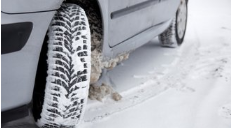
Skiing enthusiasts and lovers of winter weather understand the importance of winter tires and when to prepare their vehicle for changing road conditions. Frozen roads, snow, and ice make driving conditions dangerous and regular all-season tires are usually not able to handle the hazards. As winter weather approaches, make sure your vehicle won’t leave you stranded or waiting for an accident.
Difference between Winter Tires and Summer Tires
Winter tires add an extra layer of security when driving in snow and ice. The tread on winter tires is designed to gain traction, reduce snow build up during severe weather conditions, and offer more stability. Most winter tires are made of tread rubber that will stay flexible even at low temperatures which offers the driver more control. Drivers can feel more confident when traveling on snowy icy roads with a good set of snow tires on their car.
Summer or All-Season tires are made for speed and agility. The tread on these tires allows for more precision on dry roads at moderate temperatures. With fewer grooves and more rubber hitting the road, summer tires can grip the highway and offer more flexibility. The width and rim diameter of the summer tire adds increased capabilities when driving in wet conditions and the tread helps to funnel water to resist hydroplaning.


